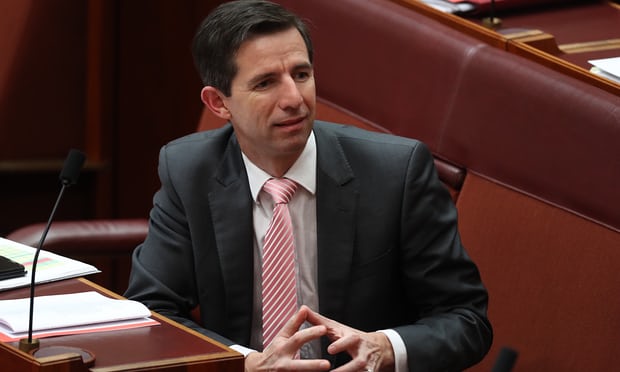Australia/Enero de 2018/Fuente: The Guardian
Resumen:
Los australianos deberían cuestionar cuánto ganan los vicerrectores de la universidad, ha declarado el ministro de educación, en medio de la controversia en el Reino Unido sobre el «escandaloso» salario del vicerrector de la Universidad de Bath, que era solo la mitad del equivalente mejor pagado de Australia.
Simon Birmingham dijo el jueves que las universidades deberían reconsiderar los pagos de sus altos ejecutivos, algunos de los cuales ganan más de un millón de dólares al año en beneficios salariales y de alojamiento.
El miércoles, la vicerrectora de la Universidad de Bath, Dame Glynis Breakwell, se retiró después de la controversia sobre su salario de £ 468,000 al año ($ 812,500). El furor provocó una conversación nacional y llevó a los estudiantes a las calles en señal de protesta.
Australians should question how much university vice-chancellors earn, the education minister has declared, amid controversy in the UK over the “outrageous” salary of the University of Bath’s vice chancellor that was only half that of Australia’s highest-paid equivalent.
Simon Birmingham said on Thursday that universities should reconsider the pay packets of their senior executives, some of whom earn more than a million dollars a year in salary and accommodation benefits.
On Wednesday, the University of Bath vice-chancellor, Dame Glynis Breakwell, retired after controversy over her salary of £468,000 a year ($812,500). The furore led to a national conversation and drove students to the streets in protest.
According to the Australian, 12 vice-chancellors in Australia took home more than a million dollars in 2016, and the University of Sydney’s Michael Spence nearly doubled Breakwell’s total pay at $1.44m.
Breakwell was paid less than UNSW’s Ian Jacobs ($1.25m) and the Australian Catholic University’s Greg Craven ($1.24m), among others. The vice-chancellor of Oxford, Louise Richardson, made even less at £350,000 ($600,000), putting her below the heads of Newcastle University, James Cook University, and the University of Southern Queensland.
Birmingham said the international comparison should prompt taxpayers to ask if they were “getting value for money”.
“While Australians recognise the high level of skills needed to run a university, many taxpayers would question why remuneration should exceed global benchmarks.”
Vice-chancellor salaries are set by each university’s board or senate without government input.
The president of the National Tertiary Education Union, Jeannie Rea, said the salaries were “extremely embarrassing” and “out of proportion”.
“It used to be the case that a vice-chancellor would be paid some proportion, or related to that of a senior professor, plus some. They saw themselves as leaders of an academic institution, now they see themselves as CEOs.”
Belinda Robinson, the chief executive of Universities Australia, said the minister’s attack on salary was an attempt to distract from the government’s recent $2.2bn cuts to university funding.
“This distraction strategy will not hoodwink the community,” she said.
Rea agreed: “It’s somewhat flippant to say you can redistribute vice-chancellor’s salary and be able to pay for a whole lot of things. The underfunding of university places is a much bigger problem than that.”
Guardian Australia contacted several universities about the salaries of vice-chancellors.
The ACU’s deputy vice-chancellor, Stephen Weller, said Craven’s salary included the accommodation costs of managing a national, multi-campus university.
The University of Sydney, UNSW and the University of Queensland similarly said the million-dollar sums included superannuation and a housing allowance.
A spokesman for the University of Queensland, whose vice-chancellor Peter Høj earns $1.15m a year, said “the combined annual salaries of all Australia’s vice-chancellors comprise about 2% of the government’s latest cuts to the university sector”.
“UQ has 52,000 students and is ranked in the top 50 of more than 10,000 universities globally. As a point of comparison, the University of Bath has 17,308 students enrolled.”
Fuente: https://www.theguardian.com/australia-news/2018/jan/22/pay-of-australian-university-heads-called-into-question-after-uk-protest










 Users Today : 7
Users Today : 7 Total Users : 35460216
Total Users : 35460216 Views Today : 10
Views Today : 10 Total views : 3418905
Total views : 3418905